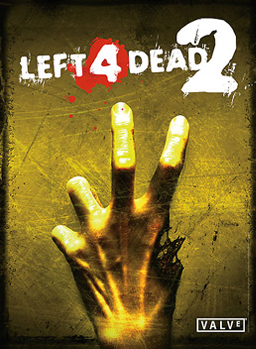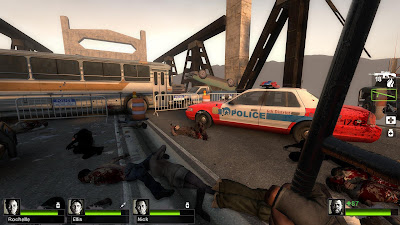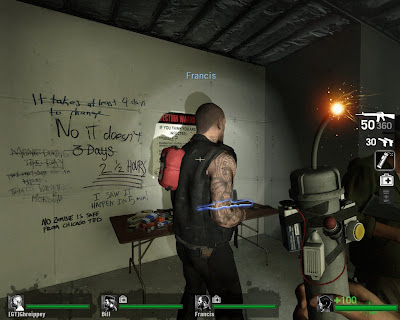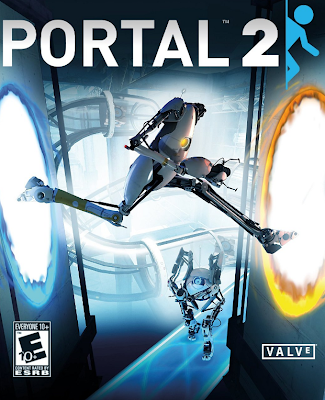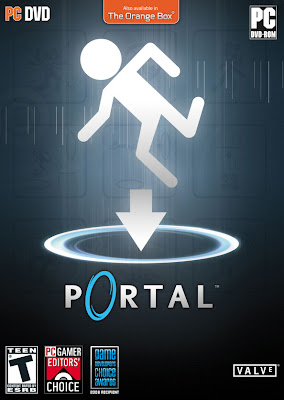The Short
Pros- Excellent first-person shooter with unique weapons, story, and setting
- Lots of variety helps mix up the shooting with other sections
- Years ahead of its time graphically. Game can still be knocked up to some crazy settings on modern machines.
- Voice acting and story are superb and entertaining throughout
- Universe/world is compelling and leaves you wanting more
- Physics engine is still impressive to this day
- Gravity gun is still one of the funnest toys in gaming
- While
Half-Life completely reinvented how FPS games are viewed,
Half-Life 2 did the same thing for modern shooters
Cons- Game feels a bit long
- Any vehicle segment feels tacked on, has clunky controls, and just straight up isn't fun
- You pack such an arsenal the game isn't very hard by the time you hit the second half
- Not a lot of enemy variety or boss battles
- While it is still a landmark game, it was completely dwarfed by its own episodic sequels and many modern FPSes (
Bioshock comes to mind)
 |
| Time to tackle what many people feel is the best PC game ever made. |
The Long
Half-Life was a groundbreaking game for the industry. Where FPS games had become tournament style deathmatches with little in terms of goals or story, Half-Life completely turned all this on its head. It released a game that valued its setting and characters as much as it did its shooting, starting off slowly to build a scene before letting everything go to hell. It pioneered the "corridor shooter" or "setpiece shooter," where triggered events in the world gave a distinct sense of progression while still telling a story and providing a hefty dose of spectacle. I still remember getting a Sierra-On-Line fan magazine at the time and Half-Life being the upcoming game featured. I thought it looked pretty awesome, having no idea the impact it would have.
Six years later in 2004, Half-Life 2 finally came out. It had truckloads of hype behind it. From the publicity when their source code was stolen to the fact the game had been delayed constantly and that it was tied to Valve's new "Steam" platform in order to operate, Half-Life 2 had a lot to live up to. And guess what: it pulled it out in spades. Where Half-Life proved that FPS games could be more than just tournament shooters, Half-Life 2 bumped that up a notch. With great shooting, impressive physics and graphics, and excellent storytelling (especially for a shooter), it pushed the industry forward and helped shape the way FPS games are made all the way to this day. Games like Call of Duty and Halo are still playing catch-up with Half-Life 2, and if anything that really goes to show how far ahead of it's time this game was.
But it isn't perfect. Which I will get to shortly.
 |
| The engine still looks pretty dang good, even today. |
Half-Life 2 picks up several years after
Half-Life ended, and in such a strange way some people (myself included) might find it hard to pinpoint the connection between the two games. Since unleashing a portal to space/hell in
Half-Life, the world has been overtaken by a race of alien called the Combine who have enslaved humanity for relatively unknown means. One of Gordon Freeman's old associates (Breen) acts as overlord and slave to the Combine, and you simply appear on a train in City 17 (just another enslaved city) before heading off on your adventure to free mankind.
The details of the story are convoluted, though I appreciate the attempt to make this universe large and interesting. What really draws you in are the characters and the excellent pacing (at least at the start). The game does a lot to draw you into the atmosphere of this bleak, crappy future, and the excellently voiced and animated characters only help push this forward. While the details of mankind's enslavement, the status of humanity, and plenty of other important tidbits are relatively hidden under the convoluted storyline, what you are given is presented so well it is easy to overlook the fact that the main story is kind of... nonexistent.
One big problem I had with the story, however, is how it seems to come in spurts. In the beginning, where it has a good blend of talking, atmospheric setting, and action, the game feels very well paced. Unfortunately, it then decides to just drop you off in the middle of nowhere with a crowbar, leading to several hours of no interaction with other people at all. Since Gordon Freeman is mute all the time (which is also sort of annoying with regard to trying to have a character someone can relate to and interact with the plot) these bouts alone are pretty much void of all story. Then you hit a landmark, get fed a ton more story, and are sent off alone again. While the atmosphere makes up for a lot (and the final act manages to have a good deal of plot), I can't help but think the pacing is a bit off once you leave City 17.
 |
| Luckily the shooting is good enough to keep you entertained. |
Where
Half-Life 2 shines is the setpieces it puts you into, even if they aren't particularly story related. Ravenholm is regarded as the prime example: a city overrun with headcrab zombies and half the city burning down and corpses piled up set the mood. But, unfortunately, these absolutely incredible setpieces seem to be padded on either side by a lot of bland, generic areas with the same enemies. Yes, it's awesome to go to some really cool places, to drive up the coast, to use antlions to murder a bunch of dudes and clear out a base. But then it's back to running around in sewers shooting the same enemies over and over, performing some bad first-person jumping puzzles or having to move crates about in silly physics puzzles that make no sense in the actual world. I get it: you made an awesome physics engine, and the Gravity Gun is totally sweet. But that doesn't mean 90% of the puzzles need to involve moving stuff around to make your physics work.
So you have a lot of really good setpieces mixed with some boring segments. Gee, sounds like every shooter to follow Half-Life 2 just does the exact same thing. Well...yep, that would be accurate. Again, keep in mind that these little side-adventures are really good. Shooting down spaceships in real time and watching them crash into things (also in real time) and the physics just going crazy and being realistic is totally nuts, especially considering when this game came out. There's just...the pacing is so off here. And I like the shooting and all, it just feels like the lulls go on for too long, and a good portion of the game ignores other shooters that had come out since then. Keep in mind: Half-Life 2 came out after Halo 2 (maybe just a few days after, but a good deal past Halo: Combat Evolved). While Half-Life 2 certainly pantsed Halo on the physics side, Halo 2 did the exact same setpiece bits but kept it interesting throughout. Again: I'm not saying Halo 2 is better than Half-Life 2, and it certainly wasn't as influential, but when you put the two games next to each other as straight shooters, Halo 2 often comes off as being funner and faster paced (and has included multiplayer, which Half-Life 2 did not).
 |
| Alyx Vance: Winning nerds' hearts since 2004 |
There are plenty of other problems to be found here. The game often requires you to get behind a vehicle, which straight up
sucks. Vehicles control decently and are fun to drive for the first 10-15 minutes, but some of these segments involve driving them around for
hours, getting out and shooting stuff or doing a physics puzzle (or worse: doing a physics puzzles
in the vehicle) and then driving around some more. The boat section especially, while having some totally awesome chase sequences at the beginning (where they drop mines as you are skimming through an aquaduct and they are air-dropping guys you then squish) is
fantastic. But then it drags on, back into that "in-between" time padding around cool scenes, and it gets tedious. Same with the car/buggy thing you drive around the coast. You do some crazy stuff on it, but it is padded by so much boring driving and having to get out, shoot some guys and do some really bad first person jumping (whoever decided that bridge climbing/traversing part should stay in the game should be punched) and then it's back in the car. For the time, yeah I'll give it to
Half-Life 2 because it made a game that was long and relatively engaging all the way through, and the crazy physics did provide some fun in the downtime. But still...this is just bad game pacing. It's like they had a 5 hour game and they felt the need to stretch it out much longer because of what the fans wanted. I think the
Half-Life 2 episodes only prove that
Half-Life 2 works best in small, concise and well-planned chunks.
Half-Life 2 feels bloated.
 |
| The opening segments are still extremely powerful, though. |
I feel the need to stop here and lay down this disclaimer: I really like
Half-Life 2. I was blown away when it came out, and replaying it recently I found I still enjoyed the adventure. I just feel that, looking back, we
really cut this game a lot of slack for a myriad of problems. I will never deny how influential it was on shooters and how it pretty much shaped how shooters are made to this day, but just because something inspired greatness doesn't mean it itself is immune to criticism (see:
Goldeneye 64).
Half-Life 2 really hasn't aged well in the gameplay and pacing departments, people. That's all I'm trying to say here.
 |
| This game still looks fantastic. |
The graphics and sound effects, however,
have aged extremely well. It's a testament to Valve's Source engine that it was capable of processing and running on higher resolutions and setting than were available at the time of release, kind of like how
Crysis was made for systems that hadn't come out yet. The difference between
Half-Life 2 and
Crysis is that the Source engine is much more versatile. Have a crappy 766 MHz machine with 512 MB of ram and a 128 MB ATI video card (these were the specs of my machine when the game first came out)? Bump down the settings and it'll run. Have a modern Mac Mini with a duel-core processor, a decent video card and 8 GB of RAM? Crank those graphics up and see how well everything still looks. It's been eight years since this game came out, and it
still looks
really good on powerful machines, and even on the Xbox 360 release of
The Orange Box. Which is also probably why Valve still uses the Source engine, even for their modern games like
Portal 2.
Voice acting, when it happens, is all excellent. The sound effects are also fantastic, with the screams of the headcrab zombies (a mixture of violent howling and cries of pain) still being horrifying enough to get a jump out of me whenever I hear it. When it comes down to the little things, Valve tends to succeed, and it does good at making Half-Life 2 still relevant even all these years later.
 |
| I still hate you, hover-water-bike-thing. But I'll be damned if that water doesn't look incredible. |
So...the final verdict?
Half-Life 2 is still decent, and is certainly worth playing if you haven't yet. If you have you probably have rose-tinted nostalgia glasses and will hate me ripping into it, but hey...the truth hurts. As I said before, the
Episodes following this game pretty much put it completely to shame (even if the long-delayed release of
Episode 3 has become pretty much a joke at this point), condensing the better bits of the game into short, manageable sections. While it still is an excellent single-player shooter that is an exciting adventure and has some really cool story bits, the excessive padding and vehicle segments really get under my skin. It just goes to prove that laying the groundwork for bigger and better things is still important, but it doesn't mean you did everything right the first time.
Three out of five stars.  |
| You are awesome, Half-Life 2. You are just starting to show your age. |
















